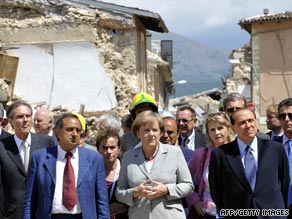
Leaders of the world’s most powerful economies pledged to seek huge cuts in their greenhouse gas emissions at a summit in Italy on Wednesday.
The Group of Eight leaders said they would “join a global response to achieve a 50 percent reduction in global emissions by 2050 and to a goal of an aggregate 80 percent or more reduction by developed countries by that date.” The goal mirrors one adopted by the U.S. House of Representatives last month. Despite the G-8 leaders’ pledge to cut emissions, developing nations may not follow suit — and G-8 leaders stopped short of calling on them to set specific targets. Instead, they “called upon major emerging economies to undertake quantifiable actions to collectively reduce emissions significantly below business-as-usual by a specified year,” the White House said. U.S. President Obama joined the leaders of Britain, Canada, France, Germany, Italy, Japan and Russia in the mountain town of L’Aquila, which was devastated by a 6.3-magnitude quake in April, for the meeting. Chinese President Hu Jintao was expected to attend the summit but returned home Wednesday to deal with deadly ethnic clashes in China’s remote western Xinjiang province that have prompted a massive security clampdown. Watch report from CNN’s Ed Henry » China’s problems add to a list of global concerns overshadowing the talks, including the recent political turmoil in Iran and North Korea’s nuclear ambitions, both of which have prompted renewed talk of major economic sanctions. Though Hu was forced to return home, representatives of the other “plus five” group of emerging economic giants, including Brazil, India, South Africa and Mexico, are to attend Thursday’s session, with discussions looking ahead to a major environmental summit in Copenhagen, Denmark. A senior Chinese official, Dai Binnguo, is standing in for Hu in Italy.
Don’t Miss
Pope blasts capitalism ahead of G-8 meeting
Blog: What’s the point of the G-8
Special Report: Going Green
After the summit’s first session, Obama and other leaders toured the area damaged by the quake, which killed about 300 people and left 45,000 homeless. Watch as leaders tour quake zone » Obama is expected to push for further international financial stimulus packages at the summit, reflecting continued concerns over the global economic crisis despite massive government spending to halt the downturn. Watch what’s on agenda at G-8 summit » The summit’s host, Italian Prime Minister Silvio Berlusconi, is probably hoping that the three-day event will help draw the spotlight away from recent scandals that have prompted questions over his suitability to lead. Prone to gaffes and facing a divorce from his wife of 19 years, the Italian prime minister is being investigated over allegations that he paid for sex, claims that he has repeatedly denied. Berlusconi has made a show of moving the summit from its original venue on the island of Sardinia to L’Aquila, in the mountains of central Italy, as a gesture of support for the region. Watch Berlusconi talk to CNN about scandals he faces » A massive security operation has been put in place around the town, which is still hit by regular aftershocks. Italy claimed last week that it had arrested six members of a left-wing terrorist group who were plotting an attack on the summit. Meanwhile, Pope Benedict XVI launched his own verbal assault on global capitalism ahead of the meeting, lambasting “grave deviations and failures” and calling for a “profoundly new way of understanding business enterprise.” The pope, who is due to meet Obama on the summit’s sidelines, challenged bankers to turn away from the practices blamed for bringing about the global economic crisis and instead use their power to help the world create wealth and economic development. “Above all, the intention to do good must not be considered incompatible with the effective capacity to produce goods,” Benedict said. After a G-20 summit of leading powers in London, England, in April that critics claim was little more than a photo opportunity despite pledges of global economic cooperation, some have questioned what tangible gains can be made from this week’s meeting.
Ahead of the summit, British Prime Minister Gordon Brown warned that the financial crisis is far from over, echoing White House calls for further economic stimulus — something that is likely to meet resistance among European leaders. Former British Prime Minister Tony Blair, who is campaigning for greater environmental awareness, said Tuesday that the G-8 was expected to set out a framework for tackling climate change that would be carried forward to the Copenhagen meeting.